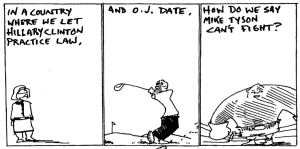Axis of stupid – How can we explain George W. Bush’s call for action against Iran, Iraq, and North Korea, the “Axis of Evil”? The notion that Iran, Iraq, and North Korea form any kind of axis is preposterous on the face of it, as has been pointed out by any number of observers. Iran and Iraq are traditional and very deadly enemies and North Korea seems to exist in an isolated fantasy world comparable only to that of Jose Gaspar Rodriguez Francia (‘~el Supremo”), whose rule of Paraguay in the early 19th century prohibited people and goods from entering or leaving the country.
I suspect that Bush’s otherwise goofy pronouncement is a product of his discovery of the wisdom of Randolph Bourne’s maxim “War is the health of the state.”As head of state, he naturally wants it to be healthy. We’ve had a nice little war to vanquish the Taliban with hardly a single American casualty. That war made the state more popular,

enabling the president to increase taxes and the power of the state. But that war is over. For the state to continue to grow more health, new opponents must be found.
What Iran, Iraq, and North Korea have in common is governments that are immensely disliked (and with good reason) by most Americans – disliked enough, I suspect Bush believes, that’Americans will be happy to wage war against them.
I am not so sure that Bush is right about this. Americans were good and mad about the terrorist attacks of Sept. 11, and accepted the view that Osama was behind them and that the Taliban were harboring Osama. But during the last ten years, neither Iraq nor Iran nor North Korea has done the U.S. any more harm than did el Supremo, and none show any inclination to try to do so. Historically, Americans have never had much enthusiasm for wars against countries that do not threaten us, especially once there are casualties. And – unlike the Taliban – Iraq, Iran, and North Korea are certainly capable of causing casualties.
When I was a teenager, I read Latin American history voluminously. I remember one episode to this day. Sometime in the 1860s, a mob in one of Bolivia’s capitals stormed the British embassy, grabbed the ambassador, stripped him naked, and paraded him through the streets so that locals could spit on him. The news was brought to Queen Victoria along with a proposal for Britain to recover its honor by invading the Andean country. Victoria rejected the proposal, choosing instead to issue a command that Bolivia no longer appear on maps issued by the British government.
For all I know, the story is apocryphal. But even a fable can contain an important lesson.

